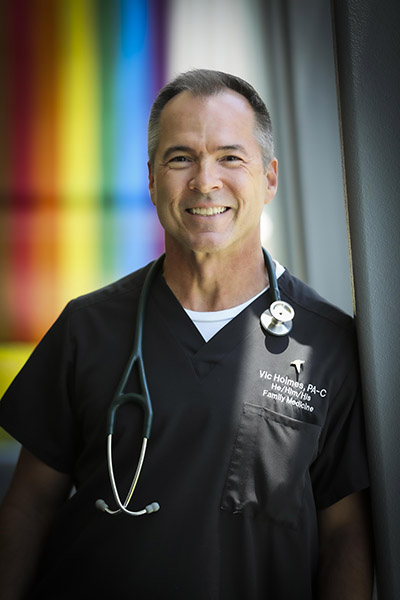HSC Pride: Increased pronoun use is an emerging trend among health professionals
The embroidery on Vic Holmes’ black scrubs identify him as a physician assistant and an ally to LGBTQ+ patients.
The words, stitched under a rainbow-colored Caduceus pin and near his heart, read: “Vic Holmes, PA-C, He/Him/His, Family Medicine.”
Pronouns are gracing more white coats, scrubs, business cards, name badges and email signatures at The University of North Texas Health Science Center at Fort Worth (HSC). It’s part of a growing national trend that allows medical professionals and students to connect with patients.
“Pronouns are a reflection of who we are and how we feel about ourselves,” Holmes said. “Gender identity is something people know on the inside even if it is not as visible on the outside. When we try to match the pronoun to the individual, it makes that individual feel more like them self.”
Pride Month is a time when the LGBTQ+ community can express the “joy of being able to be who we are,” he said. It is also a time to open conversations about issues that matter to the LGBTQ+ community, including why pronouns are important identifiers.
“My pronouns are he and him,” said Holmes, associate professor in the School of Health Professions. “If we were talking and you referred to me as ‘she’ or ‘her,’ it makes me feel like you are not actually seeing me. It makes me feel that you don’t actually see the person that I am or the person that I am trying to be.”
Pronouns are gaining more usage among doctors, physician assistants, health professionals and medical students. HSC has responded by making the practice more accessible.
“Wearing pronoun pins, regardless of your identity, it makes it easier for people to come forward who are transgender without putting too much of a spotlight on it. It normalizes it,” said Samantha Skipton, a second-year student at Texas College of Osteopathic Medicine (TCOM).
Skipton, who serves as the President of Pride at UNTHSC, said many medical students are adding pronouns to email signatures, pins – anything that tells patients: “I’m a safe person to talk to.”
This summer, Skipton’s student organization is raising awareness about pronouns while also raising dollars for money for The Trevor Project by selling pins that read: “Ask me about ‘my’ Pronouns.”
The Trevor Project is a national organization that offers suicide prevention services to LGBTQ+ students who are younger than 25.
Holmes, who first put the pronouns on his scrubs in 2018, said the practice is being embraced by people outside the LGBTQ+ community.
“In every community, there are medical individuals who are having those put on their scrubs because they recognize this is something that helps them connect with patients,” he said.
Holmes said wearing his pronouns is a way of connecting with people and a way of telling people “I know who you are. I appreciate who you are and I am not going to treat you as something other than who you are.”
“By knowing what my pronouns are you know how to talk to me and by me knowing your pronouns, I know how to talk to you and we feel like we are connecting.”
Making the pronouns easy to access lets the LGBTQ+ community feel supported by HSC, Holmes said.
“A silent symbol speaks loudest to those who need to see it,” he said.
Holmes said this is not the first time he feels supported by the University.
In 2013, Holmes and his husband were one of two couples that challenged the State of Texas’ ban on same-sex marriage. As issue of marriage equality filled the national arena, Holmes said he received support from HSC.
“That was clearly something that was going to bring publicity and it may not have been the kind of publicity that this school wanted,” Holmes said.
The message Holmes got from his supervisor was: “How can we help you? Are you going to be OK? Are you going to be safe at home?”
Holmes said he never sensed that the University was worried his case would impact HSC negatively.
“Supportive was an understatement,” he said.



![Uyen Sa Nguyen Scaled[58]](https://www.unthsc.edu/newsroom/wp-content/uploads/sites/16/Uyen-Sa-Nguyen-scaled58-145x175.jpg)


Social media